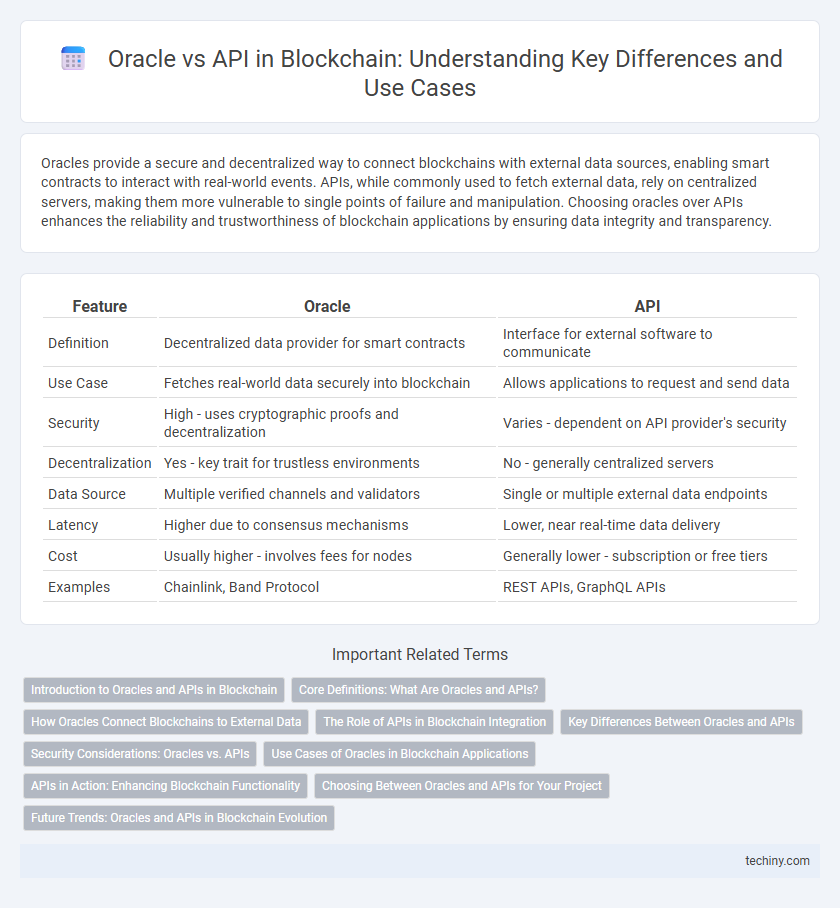Oracles provide a secure and decentralized way to connect blockchains with external data sources, enabling smart contracts to interact with real-world events. APIs, while commonly used to fetch external data, rely on centralized servers, making them more vulnerable to single points of failure and manipulation. Choosing oracles over APIs enhances the reliability and trustworthiness of blockchain applications by ensuring data integrity and transparency.
Table of Comparison
| Feature | Oracle | API |
|---|---|---|
| Definition | Decentralized data provider for smart contracts | Interface for external software to communicate |
| Use Case | Fetches real-world data securely into blockchain | Allows applications to request and send data |
| Security | High - uses cryptographic proofs and decentralization | Varies - dependent on API provider's security |
| Decentralization | Yes - key trait for trustless environments | No - generally centralized servers |
| Data Source | Multiple verified channels and validators | Single or multiple external data endpoints |
| Latency | Higher due to consensus mechanisms | Lower, near real-time data delivery |
| Cost | Usually higher - involves fees for nodes | Generally lower - subscription or free tiers |
| Examples | Chainlink, Band Protocol | REST APIs, GraphQL APIs |
Introduction to Oracles and APIs in Blockchain
Oracles serve as trusted data feeds that enable blockchains to securely interact with real-world information, bridging the gap between on-chain smart contracts and off-chain data sources. APIs, or Application Programming Interfaces, facilitate communication between blockchain networks and external systems by providing predefined protocols for data exchange. While APIs allow direct data queries, oracles enhance blockchain data reliability by validating and verifying external inputs before integrating them into decentralized applications.
Core Definitions: What Are Oracles and APIs?
Oracles are decentralized data providers that deliver real-world information to blockchain smart contracts, enabling automated decision-making based on external inputs. APIs (Application Programming Interfaces) are centralized protocols allowing different software systems to communicate by sending and receiving structured data. Unlike APIs, oracles bridge on-chain and off-chain environments with enhanced trust and security through cryptographic verification and decentralization.
How Oracles Connect Blockchains to External Data
Oracles serve as trusted intermediaries that securely relay real-world data to blockchains, enabling smart contracts to execute based on external information. Unlike APIs, which directly provide data to applications but lack inherent blockchain integration, oracles validate and feed data through cryptographic proofs to ensure tamper-proof consensus. This connection allows decentralized applications to interact reliably with off-chain events such as market prices, weather conditions, or IoT sensor readings.
The Role of APIs in Blockchain Integration
APIs serve as crucial intermediaries in blockchain integration, enabling seamless communication between blockchain networks and external systems by providing standardized data access methods. Unlike oracles, which supply external real-world data to smart contracts, APIs offer programmable interfaces for data retrieval, transaction submission, and blockchain interaction. Well-designed APIs enhance blockchain scalability and interoperability by facilitating efficient data exchange across decentralized applications and traditional platforms.
Key Differences Between Oracles and APIs
Oracles bridge blockchain networks with external data by validating and securely transmitting real-world information, while APIs serve as interfaces enabling software applications to communicate and exchange data. Oracles often incorporate cryptographic proofs and consensus mechanisms to ensure data integrity for smart contracts, whereas APIs rely on direct data access without inherent trust guarantees. The decentralized nature of oracles contrasts with the centralized control typically seen in APIs, making oracles essential for trustless environments within blockchain ecosystems.
Security Considerations: Oracles vs. APIs
Oracles provide enhanced security in blockchain environments by delivering tamper-resistant, real-world data through decentralized networks, reducing vulnerabilities seen in single points of failure common with traditional APIs. APIs often expose blockchain applications to risks such as data manipulation, unauthorized access, and downtime due to centralized control. Secure oracle solutions employ cryptographic proofs and consensus mechanisms to ensure data integrity, making them more reliable for executing smart contracts compared to conventional API integrations.
Use Cases of Oracles in Blockchain Applications
Oracles play a crucial role in blockchain applications by securely bridging external real-world data with smart contracts, enabling use cases such as decentralized finance (DeFi), supply chain tracking, and insurance claim automation. Unlike traditional APIs that provide direct access to data without blockchain verification, oracles validate, aggregate, and deliver trusted data feeds to decentralized networks, ensuring transparency and trustworthiness. Use cases include price oracles for real-time asset valuation, weather oracles for parametric insurance triggers, and event oracles for gaming and betting platforms.
APIs in Action: Enhancing Blockchain Functionality
APIs play a crucial role in enhancing blockchain functionality by enabling seamless communication between blockchain networks and external systems. They facilitate real-time data exchange, allowing smart contracts to interact with off-chain data sources and trigger automated actions. By integrating APIs, blockchain platforms improve scalability, interoperability, and responsiveness, driving more dynamic and practical decentralized applications.
Choosing Between Oracles and APIs for Your Project
Choosing between oracles and APIs for your blockchain project depends on the need for data reliability and decentralization. Oracles provide secure, tamper-proof external data feeds essential for smart contract execution, while APIs offer simpler, direct access to real-world data but may lack trustlessness and security guarantees. Evaluating the trade-offs in data integrity, latency, and decentralization helps determine the optimal integration method for your blockchain application.
Future Trends: Oracles and APIs in Blockchain Evolution
Oracles are poised to revolutionize blockchain by securely bridging on-chain smart contracts with off-chain data, enabling more complex and real-world applications. APIs complement this by providing standardized interfaces for data exchange, facilitating seamless integration and interoperability between diverse blockchain networks and external systems. Future trends emphasize the convergence of decentralized oracle networks with advanced APIs to enhance scalability, security, and real-time data accuracy in blockchain ecosystems.
Oracle vs API Infographic

 techiny.com
techiny.com